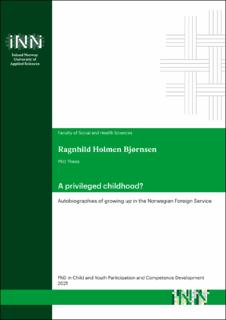A privileged childhood? : Autobiographies of growing up in the Norwegian Foreign Service
Abstract
This PhD thesis is a phenomenological and narrative inquiry into the lives of adults who have grown up within the institutional framework of the Norwegian Foreign Service (NFS). They have been mobile child dependents of employees who are sent on multiple missions overseas, commonly referred to as ‘classic’ “Third Culture Kids” (TCKs). The thesis asks: What does it mean to have had a childhood within the NFS? This is explored both as childhood experiences and circumstances, and in terms of how participants perceive themselves and live their lives as adults. Through narrative analysis of 43 written and oral retrospective autobiographies, the thesis aims to provide a bottom-up narrative of globalisation through participants’ eyes. Approaches from psychological anthropology and sociology of emotions are applied, conceiving cultural narratives as carriers of “feeling rules”. Article 1 finds a possible disconnection towards the emotional self and towards parents, due to a mismatch between a “privileged” narrative as told versus childhood as experienced. Narratives of ascribed “privilege” tighten the range of socially acceptable emotions. Article 2 finds that multiple relocations can lead to a disconnection towards place, friends and community. However, participants who negotiated “home” and “journeying” with their parents kept a connection to home, and journeys were experienced as predictable and meaningful. Article 3 finds that the diplomat child exists in a legal loophole from a child welfare perspective. Further, TCKs can face barriers to realising their rights because assumptions over “privileged mobility” foster others' non-involvement of the private sphere. Participants seek to resolve these tensions of disconnection. There is a tendency to go from serial mobility in young adult life, towards seeking connection to one location and to locally bound relationships in later adulthood. From fragmented pasts, participants create coherent narrative selves like a melody moving back and forth between perspectives: between opposing tones of push- and pullmigration; between the child and the adult self; between ascribed “privileged” status and selfperceived gratitude. Their gratitude is anchored in abilities to shift mental and emotional perceptions, and towards their accumulated values. A salient underlying value is a wide empathy map, stretching across cultural differences and physical distances, but rooted in local childhood encounters. These findings shed light on dimensions of disconnection, stereotypes and narrative power which will have relevance for a growing number of children and adults as 21st century professions become increasingly mobile.
